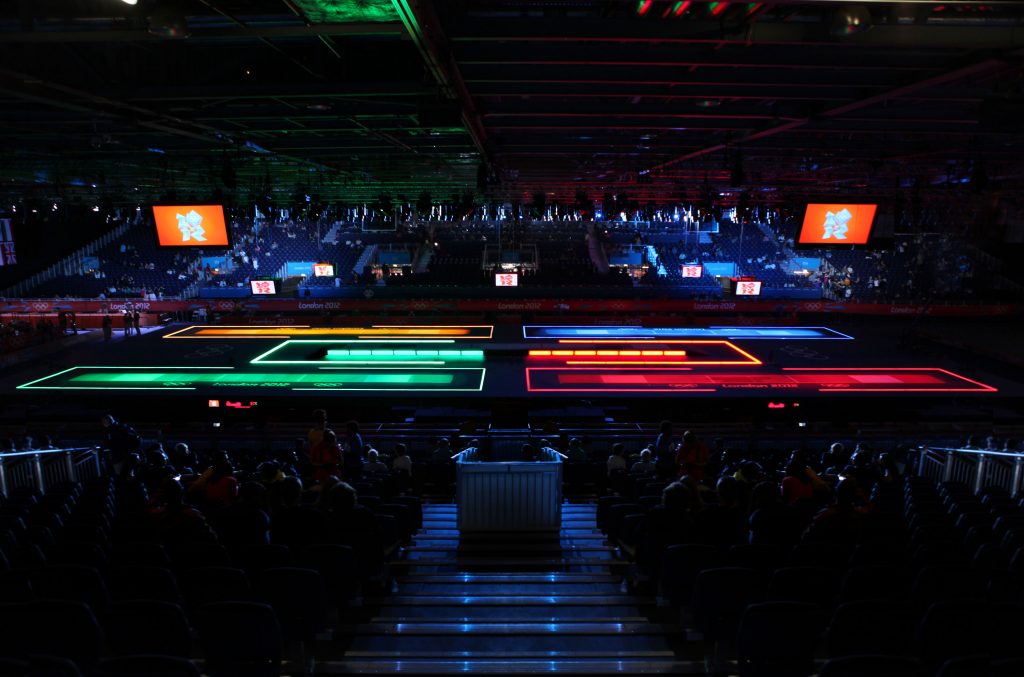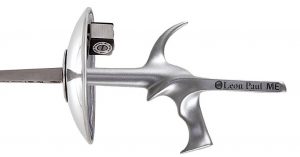We use cookies
Using our site means you agree to the use of cookies and similar technologies. Read about our policy and how to disable them here
London 2012 helped create a new vision for a fencing arena. The FIE wanted to create something completely new for the London 2012 games and Leon Paul were the team trusted to create that vision.
 London 2012 olympic fencing venue Continue reading →
London 2012 olympic fencing venue Continue reading →
I am a self confessed technology and equipment addict, there is nothing I like more in my job here at Leon Paul than designing, testing, refining and manufacturing new products.
 I am also a big believer in the difference that a number of small improvements in your equipment can make to your overall performance. This approach was spearheaded by Sir David Brailsford who coined the phrase "marginal gains" at British Cycling. Continue reading →
I am also a big believer in the difference that a number of small improvements in your equipment can make to your overall performance. This approach was spearheaded by Sir David Brailsford who coined the phrase "marginal gains" at British Cycling. Continue reading →
By Ben Paul. 14 years ago I got a call from Darth Vader asking me to work on a James Bond film… Well actually it was the fencer and sword master Bob Anderson who learned to fence from my great grandfather Leon Paul. Bob was the fencer in the Darth Vader suits in the Star Wars film and taught the actors to fence. Continue reading →
By Jon Willis Last year, after I had run a cadet competition, I overheard a fencer refer to me as ‘the man who organises competitions’. Initially, it dented my ego to think that I’m known more for running competitions than my exploits with an epee. I only retired a few years ago! However, I’m delighted to have been able to remain in fencing, to use my competitive experience to improve the standard of events in the UK and help the sport grow. Continue reading →
Risk management means judging both probability and severity of incidents - and checking your safety measures are followed and your club culture encourages people to point out safety risks! Continue reading →
Competitive HEMA is a young sport, and we’re going to need to build skills and experience in officiating as well as competing and coaching. Here’s my totally unofficial and borderline uninformed guide to being a better judge. All too often, my reaction when asked about about any particular tournament match I’ve just fought is something like “decent fencing but judges suck”. It is, I freely admit, sometimes a defense mechanism for my ego when I’ve fenced badly and lost. Yet even when I win, I usually find myself conceding points by pointing out mistakes in judges’ calls - or, in the case of those tournaments where you cannot concede points, perhaps pulling an Ingulf Kohlweiss and leaving my sword in the corner so the opponent can get a catch-up hit to make things fair. I’ve judged at events from local tournaments with a dozen fencers in a field up to SwordFish. I know I’m not the best judge, and I’ve had to self-train more than anything, but I’d like to think I’m far from the worst out there. So, here are my tips. Continue reading →
HEMA tournaments are now forming into leagues. What benefits and what risks might we expect to come with this development? One of my students just grabbed silver in the Nordic Historical Fencing League Women’s Longsword. As well as bragging, I mention this because it’s the result of four tournaments’ worth of fighting which culminated this last weekend. Like a team in a football league, there was some certainty of how places will look after the league’s final event but there was still everything to fight for if she wanted to lift the cup. Still, silver is quite an achievement in the murderer's row of Nordic Women's HEMA. Continue reading →
Continuing from last week, here are another four books that might just help your HEMA training. This week we’re getting all the enlightenment and motivation we can handle. Not the Age of Enlightenment (I prefer to deal in earlier systems) and not the “yoga, kale, smiles!” kind of motivation. Not that there’s anything wrong with yoga, kale or smiling. In moderation. Instead, I hope these readings will promote critical, informed reflection, and affirm your genuine motivation and sense of purpose in training. Continue reading →
Can I become a better fencer simply by reading? Not really. Read these anyway. In lieu of an insightful, technical, enlightening and motivational article this week, here’s a list of books that can deliver all that instead. None of them are HEMA books, instead they’re from other martial arts (or none), but I believe each and every one of them can benefit your HEMA practice. This week, we'll look at a pair of insightful works, and a pair of more technical ones. Next week, it'll be enlightenment and motivation! The works in question are my personal favourites, so it’s an incredibly subjective set of reviews. The links are to Google Books. Continue reading →
As a first post I thought I would take the opportunity to explain a little about myself and my role here. Leon Paul is a fourth generation family business with Leon being my great grandfather. Sadly I never got to meet him or his wife Nana Paul with whom he started the company way back in 1921. Continue reading →
London 2012 helped create a new vision for a fencing arena. The FIE wanted to create something completely new for the London 2012 games and Leon Paul were the team trusted to create that vision.
 London 2012 olympic fencing venue Continue reading →
London 2012 olympic fencing venue Continue reading →
Competitive HEMA is a young sport, and we’re going to need to build skills and experience in officiating as well as competing and coaching. Here’s my totally unofficial and borderline uninformed guide to being a better judge. All too often, my reaction when asked about about any particular tournament match I’ve just fought is something like “decent fencing but judges suck”. It is, I freely admit, sometimes a defense mechanism for my ego when I’ve fenced badly and lost. Yet even when I win, I usually find myself conceding points by pointing out mistakes in judges’ calls - or, in the case of those tournaments where you cannot concede points, perhaps pulling an Ingulf Kohlweiss and leaving my sword in the corner so the opponent can get a catch-up hit to make things fair. I’ve judged at events from local tournaments with a dozen fencers in a field up to SwordFish. I know I’m not the best judge, and I’ve had to self-train more than anything, but I’d like to think I’m far from the worst out there. So, here are my tips. Continue reading →
I am a self confessed technology and equipment addict, there is nothing I like more in my job here at Leon Paul than designing, testing, refining and manufacturing new products.
 I am also a big believer in the difference that a number of small improvements in your equipment can make to your overall performance. This approach was spearheaded by Sir David Brailsford who coined the phrase "marginal gains" at British Cycling. Continue reading →
I am also a big believer in the difference that a number of small improvements in your equipment can make to your overall performance. This approach was spearheaded by Sir David Brailsford who coined the phrase "marginal gains" at British Cycling. Continue reading →
HEMA tournaments are now forming into leagues. What benefits and what risks might we expect to come with this development? One of my students just grabbed silver in the Nordic Historical Fencing League Women’s Longsword. As well as bragging, I mention this because it’s the result of four tournaments’ worth of fighting which culminated this last weekend. Like a team in a football league, there was some certainty of how places will look after the league’s final event but there was still everything to fight for if she wanted to lift the cup. Still, silver is quite an achievement in the murderer's row of Nordic Women's HEMA. Continue reading →
By Ben Paul. 14 years ago I got a call from Darth Vader asking me to work on a James Bond film… Well actually it was the fencer and sword master Bob Anderson who learned to fence from my great grandfather Leon Paul. Bob was the fencer in the Darth Vader suits in the Star Wars film and taught the actors to fence. Continue reading →
Continuing from last week, here are another four books that might just help your HEMA training. This week we’re getting all the enlightenment and motivation we can handle. Not the Age of Enlightenment (I prefer to deal in earlier systems) and not the “yoga, kale, smiles!” kind of motivation. Not that there’s anything wrong with yoga, kale or smiling. In moderation. Instead, I hope these readings will promote critical, informed reflection, and affirm your genuine motivation and sense of purpose in training. Continue reading →
By Jon Willis Last year, after I had run a cadet competition, I overheard a fencer refer to me as ‘the man who organises competitions’. Initially, it dented my ego to think that I’m known more for running competitions than my exploits with an epee. I only retired a few years ago! However, I’m delighted to have been able to remain in fencing, to use my competitive experience to improve the standard of events in the UK and help the sport grow. Continue reading →
Can I become a better fencer simply by reading? Not really. Read these anyway. In lieu of an insightful, technical, enlightening and motivational article this week, here’s a list of books that can deliver all that instead. None of them are HEMA books, instead they’re from other martial arts (or none), but I believe each and every one of them can benefit your HEMA practice. This week, we'll look at a pair of insightful works, and a pair of more technical ones. Next week, it'll be enlightenment and motivation! The works in question are my personal favourites, so it’s an incredibly subjective set of reviews. The links are to Google Books. Continue reading →
Risk management means judging both probability and severity of incidents - and checking your safety measures are followed and your club culture encourages people to point out safety risks! Continue reading →
As a first post I thought I would take the opportunity to explain a little about myself and my role here. Leon Paul is a fourth generation family business with Leon being my great grandfather. Sadly I never got to meet him or his wife Nana Paul with whom he started the company way back in 1921. Continue reading →

